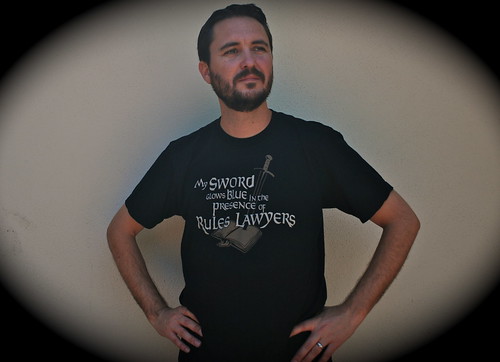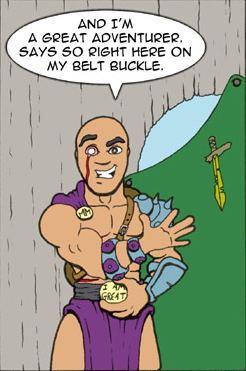Doing the Deed.
You’ve got everything ready.
You have a stack of notes a quarter inch high. On your left you have a chainmail pouch full of glittering polyhedrals, with a few artfully spilled out for ease of access. On your right you have a stack of books vaguely reminiscent of the Plateau of Leng out of mythos… high, insurmountable, and barren of topography. Before you might be a GM screen full of charts, pictures of bikini clad whatevers and critical hit modifiers… or there might just be a few cans of half-empty Mountain Dew as you frantically scrawl your last concepts (or just vaguely doodle some boobies) as the wall clock ominously ticks down to the final moments of your plan’s life.
Because no plan survives contact with the enemy, er, players.
You wrack your brain… is there anything you’ve forgotten? You’ve got enough Dew, you have Doritos hidden on top of the fridge for backup snacks, you have the Domino’s guy on speed dial, your mom is at bridge club… you should be ready. Then the first knock on the door comes. Your first player is here. In walks…
The Professional.
The Professional player is always on time. He doesn’t let down his team mates. If he’s not going to be there, he calls ahead of time, sometimes a day or more in advance, to inform you of even the slightest chance that he might not make it. Srs gamer takes gaming srsly.
You promised a +2 to hit if I brought Mountain Dew. It's in the fridge. Remember this note?
The Professional Gamer is the type who waits outside of game stores on release days… not for video games, but for new expansion books. They download PDFs of expansions you’ve never even heard of. They know every last in and out of the rules, but they don’t play to win, they play for the love of the game. The Professional is reliable, attentive, hardcore, and in most respects, completely awesome. If you’ve never had a Professional in your gaming party, then I mourn for your soul. It’s a treat. Most commonly, during generation sessions where the group is making their various characters for the first time, a Professional will sit back and help everyone create, looking for what’s not covered. They usually end up in support roles like Cleric or Paladin, or wide-spread roles like Ranger or Bard type PCs. No matter the genre, they’re there to support the other players, and make sure The Game Goes On.
At higher levels, it is not uncommon for the Professional to respec into a Gamemaster, or a Gaming Addict.
Usually paired with the Professional is the Jester… who usually doesn’t have a car.
The Jester.
The Jester, if he or she doesn’t show up with the Professional, will be a fashionable fifteen minutes to an hour and a half late as they try to spange for a taxi, bum a ride from another friend, or hoof it across town. The Jester shows up not only because they love the game, but because this is their chance to truly ‘kick it’ with people who understand them. The Jester is typically unorganized, owning not really so much as a character sheet as a character packet. Each note or scrap of paper is somehow important to the character, and they seem to innately understand the hordes of chickenscratch on snippets of pulped tree, but it would take 15 game masters and 20 cryptographers to figure out what even half of it means.
In addition to the occasional 1d6 puncture damage eradicating some of the information.
Though jokes and levity are very common in a group with a Jester attached, usually they do their best to keep the game rolling. Of all of the player types, the Jester is the most likely to bring backup Doritos or beverages, the most likely to lend his or her dice out without throwing a snit fit, and the most laid back about losing a character.
Usually close on their heels comes the Wannabe.
The Wannabe.
There’s something just not quite right about the Wannabe. Maybe they don’t understand the spirit of the game, but they know all the rules. Or maybe they really, really want to be the knight in shining armor, but they don’t understand that encumbrance counts. The Wannabe, in general, is a great person, but sometimes a fairly mediocre gamer. Usually at one end of the spectrum or the other, either completely fitting the stereo type or breaking it.
The Wannabe, for some reason, is commonly just slightly outside of the norm for gamers. It’s not uncommon for Wannabe gamers to become true gamers, but even then sometimes they wonder… are they gamer enough? Should they own more dice? Do they have enough books? Despite that sometimes nagging self doubt, it is quite common for Wannabe to level up into Professional status.
The Wannabe usually gets into gaming by someone else’s hand. Introduced to the idea by a fanatic who sold them on it. Usually, this means they come part and parcel with...
The Book Keeper… or Arcanist, as they’re sometimes called.
Hey man, I've been doing a bit of research on familiars, and...
You know the term Rules Lawyer? Most of the time it is used as derogatory. When it is a good thing, however, you’ll want to be respectful. The Book Keeper is your best friend and your worst enemy as a GM. They know all the ways you can spin or coax an extra +1 onto your character sheet, they troll the game forums for new errata daily… heck, they probably have a legion of RSS feeds going straight to their blackberry if they own one. If another party member wants to make a PC who can stop bullets with his or her crotch, the Book Keeper is the one to consult on how. On the flip side, the Book Keeper is your best way to get a player who doesn’t grasp some facet of the rules to begin to understand what’s going on behind the scenes. Since the BK is one of them (a player) and not one of Them (you, The Man, the GM, or “He Who Is Trying To Kill Us”) they have a much higher “acceptance index” for arguing minutia and displaying to the offending player that it really is impossible to fire four laser pistols at the same time no matter how many ranks in dual wield you have.
Due to the immense knowledge that the Book Keeper wields, you need, NEED to make this individual your best buddy in the game. Don’t treat them differently during the game sessions, don’t give them extra XP (unless they deserve it) or extra favors/items, but make sure you’re close buddies outside of the game. This will help defuse the inevitable arguements that crop up when you step outside of the rules and you don’t want to just put the big “GM SAYS THIS HAPPENS” boot down.
Usually there’s a little bit of a wait before the next pair shows up… they’re typically a bit late. First in the door is…
Trouble.
With a capital “T” and that rhymes with “P” and that stands for Player.
Yep. "That Guy."
Trouble usually shows up at the game when he’s bored or doesn’t have anything else to do, and is conspicuously (and sometimes thankfully) absent the rest of the time. Trouble is the player who just seems to exist to put a thorn in your rear end… or sometimes push you out of a helicopter into a forest full of cacti. They’re looking for amusement, and they don’t quite care how they get it. They may seek to derail your entire campaign by shooting your main and quite important NPC in the face for a perceived insult. They may constantly derail the game session by keeping out of game conversations going, heckling you or other players, or just generally being an asshat. Unfortunately, most of the time, Trouble is very good friends with one or more of the other players, making it virtually impossible to excise them from the game without causing social drama. They’re usually quite close to…
The MinMax.
I’d like to thank Tarol Hunt of GoblinsComic for actually making MinMax into a character. Here he is, and it explains it all:
MinMax, the Unstoppable Warrior.
The MinMax might not “get” gaming yet. They’re probably either someone who got pushed into gaming because it sounded neat, or they’re someone who’s played a lot of Risk or Xbox 360, and are still in the mindset that you need to win a game for it to be a game. In Goblins, MinMax traded several ‘useless’ skills for additional combat bonuses. For example, MinMax (in the comic) traded the following:
His ability to Wink was traded for Weapon Proficiency: Furniture.
His ability to rhyme on purpose was traded for Improved Unarmed Strike.
And so on.
MinMax players are there for destruction. They want to do the most damage, the most times, to the most creatures. They want to Win The Game. I myself was a MinMax player for a while during my youth, so there’s definite value in encouraging the MinMax player to keep playing with your gaming group… as long as you can figure out how to make sure that they don’t butcher the entire scenario in a single round. I find it very useful to send the Book Keeper out to get something from the convenience store before using some bullshit rule to immobilize the MinMax before progressing with the fight.
Now that you have most of the party around the table… the phone rings. It’s…
The Leader.
The Leader is arguably your most important player, but sometimes they won’t even bother to show up until they know, for a fact, that everyone else is in place. Sometimes they’ll show up with The Professional… and on rare occasions, you may have a dual-classed player who is both.
Honestly, I’m doing the Leader a bit of injustice with my quip above. It’s not uncommon for the Leader to show up early, or to help wrangle your other players with phone calls asking if they’re going to be at game, if there’s any problem, or anything of the sort. The Leader tends to be very involved with the players, a close friend to most, and a stern guiding hand to folks like Trouble and MinMax. He works to keep the game moving forward, to keep the players on task instead of making worthless sidetrips to the Apothecary Shoppe to find out which tentacle of the Freshwater DoomSquid is the most potent for regeneration potions, and to make sure that not only do things get accomplished, but they get accomplished with style. The Leader is usually the most charismatic gamer of the group, though this is not the case in all groups.
Of all the types pictured above, remember that there innumerable and unquantifiable combinations. You may have a Trouble Leader, or a MinMax BookKeeper (the WORST thing ever, by the way.) You may have a group without all of the components listed above, but GameMasters can’t be Deities. You can’t create your own game group, no matter how hard you try. You can, as any artist does, look around at your environment and pick the best things, and do your absolute damnedest to make some art.
Because that’s what you are. An artist. A GM paints a picture for the players, creates a world that’s so believable that it puts any book to shame, and breathes life and emotion into every moment of the game. Hopefully the profiles above will give you some hints on how to deal with a troublesome canvas.
And now to figure out what to do for Part 3. Suggestions are welcome!






No comments:
Post a Comment